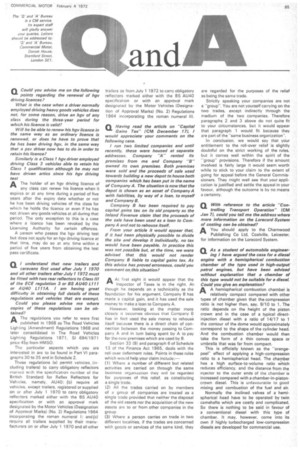Q Having read the article on "Capital Gains Tax" (CM December 17), I would appreciate your comments on the following case.
Page 89

If you've noticed an error in this article please click here to report it so we can fix it.
I run two limited companies and until recently, these were housed at separate addresses. Company "A" rented its premises from me and Company "B" owned its own premises. Both premises were sold and the proceeds of sale used towards building a new depot to house both companies which has been put in the name of Company A. The situation is now that the depot is shown as an asset of Company A with liabilities, by way of a loan, to myself and Company B.
Company B has been required to pay capital gains tax on its old property as the Inland Revenue claim that the proceeds of the sale have been used as a loan to Cornpany A and not to rehouse itself.
From your article it would appear that if it had been physically possible to divide the site and develop it individually, no tax would have been payable. In practice this was not possible but, at the time, we were advised that this would not render Company B liable to capital gains tax. As this advice has proved erroneous, could you comment on this situation?
AAt first sight it would appear that the
Inspector of Taxes is in the right. Although he depends on a technicality as the foundation for his argument, Company B has made a capital gain, and it has used the sale money to make a loan to Company A.
However, looking at the matter more closely it becomes obvious that Company B has in fact used the sale money to rehouse itself because there is a direct chain of connection between the money passing to Company A and in turn being spent by A to pay for the new premises which are used by B.
Section 33 (9) and paragraph 6 of Schedule 13 of the Finance Act 1965, deals with the roll-over deferment rules. Points in these rules which would help your claim include;—
(1) Where a number of different but related activities are carried on through the same business organization they will be regarded for purposes of this relief, as constituting a single trade.
12) All the trades carried on by members of a group of companies are treated as a single trade provided that neither the disposal of the old assets nor the acquisition of the new assets are to or from other companies in the group.
(3) Where a person carries on trade in two different localities, if the trades are concerned with goods or services of the same kind, they are regarded for the purposes of the relief as being the same trade.
Strictly speaking your companies are not a "group". You are not yourself carrying on the two trades, except indirectly through the medium of the two companies. Therefore paragraphs 2 and 3 above do not quite fit to your circumstances, but it would appear that paragraph 1 would fit because they are part of the "same business organization".
In conclusion, we would say that yciur entitlement to the roll-over relief is slightly doubtful on the strict working of the rules, but it comes well within the spirit of the -groupprovisions. Therefore if the amount involved is fairly large it would seem worth while to stick to your claim to the extent of going for appeal before the General Commissioners. They might well see that your application is justified and settle the appeal in your favour, although the outcome is by no means a certainty.














































































































































